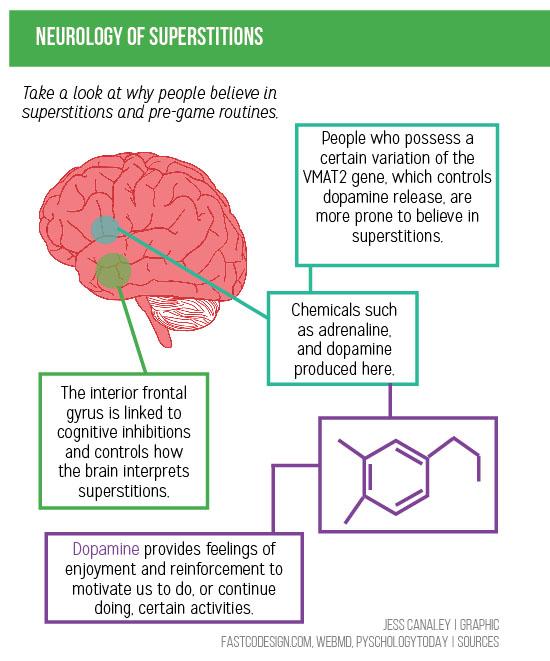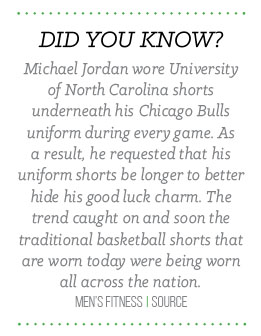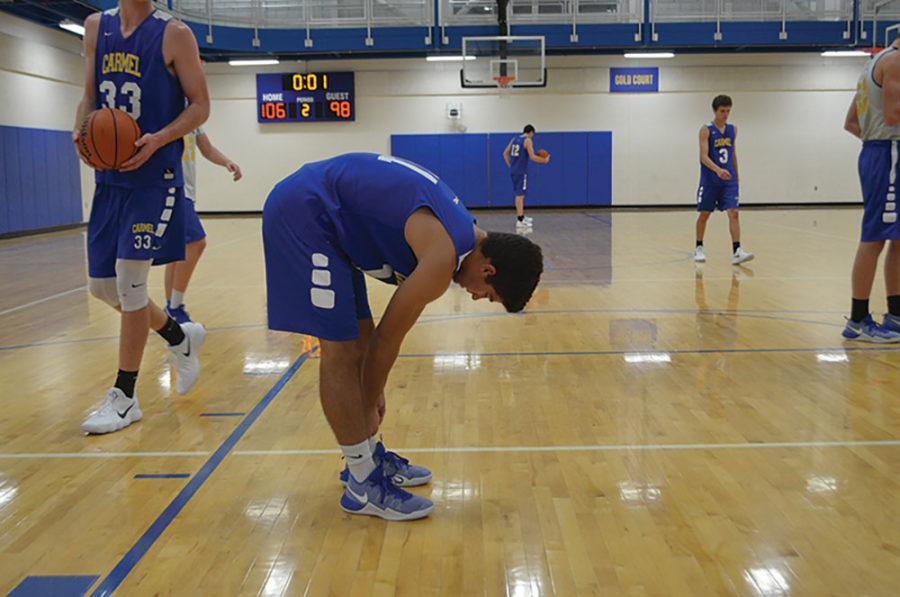Under the heat of the lights and pressure of the crowd, athletes from high school to the professional level are forced to find a way to perform at their best in each matchup. For many players, strict routines or rituals helps them focus on consistency and stay locked in the game. From LeBron James’ iconic chalk toss, to Michael Jordan’s tradition of wearing his University of North Carolina shorts under his NBA uniform, the variety of these routines aren’t limited to the superstitious.
Luke Heady, men’s basketball player and junior, is no stranger to those routines.
“For home games, I go home for a while, then get back to the high school at the same time,” Heady said. “I’m there about an hour before (the game) to shoot by myself. I have to wear the same socks every game and have (to) do the same ball handling routine before we go out to warm up.”
On the surface, it can be hard to perceive how routines prior to a matchup can affect personal or team play once the ball has been tipped. However, Ryan Osborn, head coach of the men’s basketball team, said he witnesses just how crucial these habits are to the athletes he coaches.
“I would say for players who don’t have a specific routine or if their routine is inconsistent, the way they play will show on the floor,” Osborn said. “Maybe they’re not as detailed or sharp at the beginning of the game. It can take them longer in the game to get going or they can’t get going at all. Whatever that habit is, it helps them get in the mind frame and gets them ready when they step on the floor.”
On the other hand, Tod Windlan, women’s basketball head coach, said he sees his players work together to create routines to uplift the team.
“We say the Lord’s prayer before every game, always led by a player,” Windlan said. “They really like that routine and in a tournament away from a normal game setting that’s one of the few things they absolutely need to make time for.”
In the same way, according to Osborn, keeping everyone on the same page at home and on the road is one of the largest roles a coach can play for his team.
“There are differences in where you play in what you can do here at (Carmel’s) facility compared to an opposing team’s,” Osborn said. “The biggest thing is when we arrive there. We try to mirror how we arrive at home. When the varsity guys show up here at home at 5 o’clock to go out on the floor, we want to mimic that on the road.”
The men’s team also prepares for matchups by being together prior to pregame warm ups, which gives players a chance to go over thoughts going into a contest. After this, the team unites in the locker room and suits up for game time.
“Before each game we all have a small meal,” Cole Brady, men’s basketball player and junior, said. “We always wear the same jumpsuit (on game) day to look (like) a team. The team wears the same socks and shoes for games and it makes us look (like) a team and that’s important for our image.”
Even after the regular season ends, routines aren’t altered to ensure players and coaches are comfortable and know what to expect ahead of a game.
“Everything we do in season and postseason we try to keep the same. What I do to get ready for the game is similar to a player,” Osborn said. “I have to get through certain things and check certain boxes before the pregame clock hits zero. It’s a mental thing and in preparation, when I feel like the boxes haven’t all been checked off, it can make you a little more anxious.”
Beyond coaching staff, these stressors can affect how the athletes concentrate on the game as well. Players can sense the pressure of the game ramp up when routines aren’t followed, according to Heady.
“(When I skip my rituals) if the team or I don’t play well I feel like it’s because of me messing up my routine,” Heady said.
Coaches see their players experience these variables each game. While many have advice to offer, the athletes on the court are ultimately responsible to stay focused in on playing their best.
“Everyone prepares for big moments differently,” Osborn said. “The importance isn’t necessarily what they do or when they do it, but ultimately that they have prepared and mentally they are ready to go.”

































![AI in films like "The Brutalist" is convenient, but shouldn’t take priority [opinion]](https://hilite.org/wp-content/uploads/2025/02/catherine-cover-1200x471.jpg)









































![Review: “The Immortal Soul Salvage Yard:” A criminally underrated poetry collection [MUSE]](https://hilite.org/wp-content/uploads/2025/03/71cju6TvqmL._AC_UF10001000_QL80_.jpg)
![Review: "Dog Man" is Unapologetically Chaotic [MUSE]](https://hilite.org/wp-content/uploads/2025/03/dogman-1200x700.jpg)
![Review: "Ne Zha 2": The WeChat family reunion I didn’t know I needed [MUSE]](https://hilite.org/wp-content/uploads/2025/03/unnamed-4.png)
![Review in Print: Maripaz Villar brings a delightfully unique style to the world of WEBTOON [MUSE]](https://hilite.org/wp-content/uploads/2023/12/maripazcover-1200x960.jpg)
![Review: “The Sword of Kaigen” is a masterpiece [MUSE]](https://hilite.org/wp-content/uploads/2023/11/Screenshot-2023-11-26-201051.png)
![Review: Gateron Oil Kings, great linear switches, okay price [MUSE]](https://hilite.org/wp-content/uploads/2023/11/Screenshot-2023-11-26-200553.png)
![Review: “A Haunting in Venice” is a significant improvement from other Agatha Christie adaptations [MUSE]](https://hilite.org/wp-content/uploads/2023/11/e7ee2938a6d422669771bce6d8088521.jpg)
![Review: A Thanksgiving story from elementary school, still just as interesting [MUSE]](https://hilite.org/wp-content/uploads/2023/11/Screenshot-2023-11-26-195514-987x1200.png)
![Review: "When I Fly Towards You", cute, uplifting youth drama [MUSE]](https://hilite.org/wp-content/uploads/2023/09/When-I-Fly-Towards-You-Chinese-drama.png)
![Postcards from Muse: Hawaii Travel Diary [MUSE]](https://hilite.org/wp-content/uploads/2023/09/My-project-1-1200x1200.jpg)
![Review: "Ladybug & Cat Noir: The Movie," departure from original show [MUSE]](https://hilite.org/wp-content/uploads/2023/09/Ladybug__Cat_Noir_-_The_Movie_poster.jpg)
![Review in Print: "Hidden Love" is the cute, uplifting drama everyone needs [MUSE]](https://hilite.org/wp-content/uploads/2023/09/hiddenlovecover-e1693597208225-1030x1200.png)
![Review in Print: "Heartstopper" is the heartwarming queer romance we all need [MUSE]](https://hilite.org/wp-content/uploads/2023/08/museheartstoppercover-1200x654.png)




